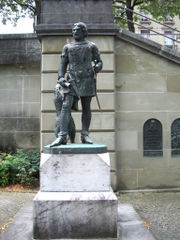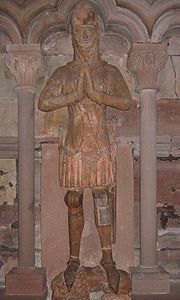
Berthold V, Duke of Zähringen
Encyclopedia


History and legacy
At the beginning of his reign, he reduced the power of the BurgundianCounty of Burgundy
The Free County of Burgundy , was a medieval county , within the traditional province and modern French region Franche-Comté, whose very French name is still reminiscent of the unusual title of its count: Freigraf...
nobles and settled the Bernese Oberland
Bernese Oberland
The Bernese Oberland is the higher part of the canton of Bern, Switzerland, in the southern end of the canton: The area around Lake Thun and Lake Brienz, and the valleys of the Bernese Alps .The flag of the Bernese Oberland consists of a black eagle in a gold field The Bernese Oberland (Bernese...
and the area of Lucerne
Lucerne
Lucerne is a city in north-central Switzerland, in the German-speaking portion of that country. Lucerne is the capital of the Canton of Lucerne and the capital of the district of the same name. With a population of about 76,200 people, Lucerne is the most populous city in Central Switzerland, and...
. As a result, he enlarged Thun
Thun
Thun is a municipality in the administrative district of Thun in the canton of Bern in Switzerland with about 42,136 inhabitants , as of 1 January 2006....
and founded Bern in 1191, which became the focus of his expansionism. At the Battle of Ulrichen in 1221, however, he failed to gain access to the Valais
Valais
The Valais is one of the 26 cantons of Switzerland in the southwestern part of the country, around the valley of the Rhône from its headwaters to Lake Geneva, separating the Pennine Alps from the Bernese Alps. The canton is one of the drier parts of Switzerland in its central Rhône valley...
.
Following the death of the Holy Roman Emperor
Holy Roman Emperor
The Holy Roman Emperor is a term used by historians to denote a medieval ruler who, as German King, had also received the title of "Emperor of the Romans" from the Pope...
Henry VI
Henry VI, Holy Roman Emperor
Henry VI was King of Germany from 1190 to 1197, Holy Roman Emperor from 1191 to 1197 and King of Sicily from 1194 to 1197.-Early years:Born in Nijmegen,...
in 1198, he was one of the candidates in the Imperial election
Imperial election
The election of a Holy Roman Emperor or King of Germany was, from at least the 13th century, accomplished by a small body of the greatest princes of the Empire, the Prince-electors. Appointment as Emperor was normally for life...
. He offered his nephews as hostages to the Archbishops of Cologne and Trier
Archbishopric of Trier
The Archbishopric of Trier was a Roman Catholic diocese in Germany, that existed from Carolingian times until the end of the Holy Roman Empire. Its suffragans were the dioceses of Metz, Toul and Verdun. Since the 9th century the Archbishops of Trier were simultaneously princes and since the 11th...
to gain their support. However, when he discovered that a majority had elected the Hohenstaufen Philip of Swabia
Philip of Swabia
Philip of Swabia was king of Germany and duke of Swabia, the rival of the emperor Otto IV.-Biography:Philip was the fifth and youngest son of Emperor Frederick I and Beatrice I, Countess of Burgundy, daughter of Renaud III, count of Burgundy, and brother of the emperor Henry VI...
(antiking
Antiking
An Antiking is a would-be king who, due to succession disputes or simple political opposition, declares himself king in opposition to a reigning monarch. Antikings are more often found in elected monarchies than in hereditary monarchies like those of England and France; such figures in hereditary...
to Welf Emperor Otto IV of Brunswick
Otto IV, Holy Roman Emperor
Otto IV of Brunswick was one of two rival kings of the Holy Roman Empire from 1198 on, sole king from 1208 on, and emperor from 1209 on. The only king of the Welf dynasty, he incurred the wrath of Pope Innocent III and was excommunicated in 1215.-Early life:Otto was the third son of Henry the...
) he renounced his claim. In exchange for this renunciation, Berthold gained territorial concessions in what is now southern Germany
Southern Germany
The term Southern Germany is used to describe a region in the south of Germany. There is no specific boundary to the region, but it usually includes all of Bavaria and Baden-Württemberg, and the southern part of Hesse...
and northern Switzerland
Switzerland
Switzerland name of one of the Swiss cantons. ; ; ; or ), in its full name the Swiss Confederation , is a federal republic consisting of 26 cantons, with Bern as the seat of the federal authorities. The country is situated in Western Europe,Or Central Europe depending on the definition....
, consolidating Zähringer hold over the Ortenau
Ortenau
The Ortenau is a historical territory in Baden-Württemberg, located on the right bank of the River Rhine. It covers approximately the same area as the Ortenaukreis, a present-day district....
, the Breisgau
Breisgau
Breisgau is the name of an area in southwest Germany, placed between the river Rhine and the foothills of the Black Forest around Freiburg im Breisgau in the state of Baden-Württemberg. The district Breisgau-Hochschwarzwald, which partly consists of the Breisgau, is named after that area...
, Schaffhausen
Schaffhausen
Schaffhausen is a city in northern Switzerland and the capital of the canton of the same name; it has an estimated population of 34,587 ....
, Breisach
Breisach
Breisach is a town with approximately 16,500 inhabitants, situated along the Rhine in the Rhine Valley, in the district Breisgau-Hochschwarzwald, Baden-Württemberg, Germany, about halfway between Freiburg and Colmar — 20 kilometres away from each — and about 60 kilometres north of Basel near the...
and All Saints' Abbey
All Saints' Abbey (Baden-Württemberg)
All Saints' Abbey was a Premonstratensian monastery near Oppenau in the Black Forest in Baden-Württemberg, Germany.-History:...
. In 1198 Philip also paid Berthold 3,000 silver Marks for renouncing his claims.
In the same year Berthold crushed an uprising of the Burgandian nobles, an event that is recorded on the gate in Freiburg.
In 1200, Berthold began extending the city-parish church of Freiburg
Freiburg
Freiburg im Breisgau is a city in Baden-Württemberg, Germany. In the extreme south-west of the country, it straddles the Dreisam river, at the foot of the Schlossberg. Historically, the city has acted as the hub of the Breisgau region on the western edge of the Black Forest in the Upper Rhine Plain...
which, after the second extension, starting half a century later, became the monastery
Monastery
Monastery denotes the building, or complex of buildings, that houses a room reserved for prayer as well as the domestic quarters and workplace of monastics, whether monks or nuns, and whether living in community or alone .Monasteries may vary greatly in size – a small dwelling accommodating only...
now known as Freiburg Münster
Freiburg Münster
Freiburg Minster is the cathedral of Freiburg, southwest Germany. The last duke of Zähringen had started the building around 1200 in romanesque style, the construction continued in 1230 in Gothic style. The minster was partly built on the foundations of an original church that had been there from...
.
The Zähringer dynasty ended with Berthold's death in 1218. Following his death the Zähringer lands were split among several nobles, and the city of Berne
Berne
The city of Bern or Berne is the Bundesstadt of Switzerland, and, with a population of , the fourth most populous city in Switzerland. The Bern agglomeration, which includes 43 municipalities, has a population of 349,000. The metropolitan area had a population of 660,000 in 2000...
become a free imperial city
Free Imperial City
In the Holy Roman Empire, a free imperial city was a city formally ruled by the emperor only — as opposed to the majority of cities in the Empire, which were governed by one of the many princes of the Empire, such as dukes or prince-bishops...
(subject only to the Emperor).
His reign is commemorated by fountain
Fountain
A fountain is a piece of architecture which pours water into a basin or jets it into the air either to supply drinking water or for decorative or dramatic effect....
s in Berne
Berne
The city of Bern or Berne is the Bundesstadt of Switzerland, and, with a population of , the fourth most populous city in Switzerland. The Bern agglomeration, which includes 43 municipalities, has a population of 349,000. The metropolitan area had a population of 660,000 in 2000...
and his tomb in Freiburg Münster.

